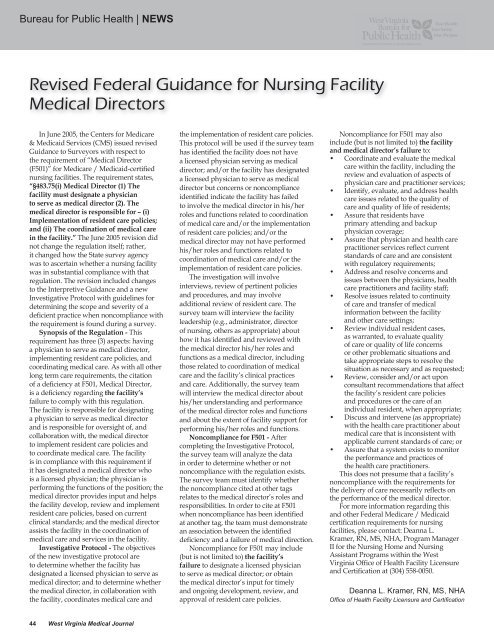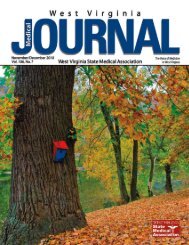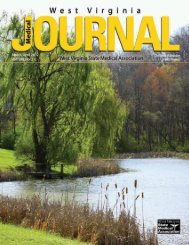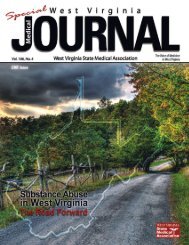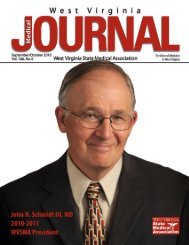September/October - West Virginia State Medical Association
September/October - West Virginia State Medical Association
September/October - West Virginia State Medical Association
- No tags were found...
Create successful ePaper yourself
Turn your PDF publications into a flip-book with our unique Google optimized e-Paper software.
Bureau for Public Health | NEWSRevised Federal Guidance for Nursing Facility<strong>Medical</strong> DirectorsIn June 2005, the Centers for Medicare& Medicaid Services (CMS) issued revisedGuidance to Surveyors with respect tothe requirement of “<strong>Medical</strong> Director(F501)” for Medicare / Medicaid-certifiednursing facilities. The requirement states,“§483.75(i) <strong>Medical</strong> Director (1) Thefacility must designate a physicianto serve as medical director (2). Themedical director is responsible for – (i)Implementation of resident care policies;and (ii) The coordination of medical carein the facility.” The June 2005 revision didnot change the regulation itself; rather,it changed how the <strong>State</strong> survey agencywas to ascertain whether a nursing facilitywas in substantial compliance with thatregulation. The revision included changesto the Interpretive Guidance and a newInvestigative Protocol with guidelines fordetermining the scope and severity of adeficient practice when noncompliance withthe requirement is found during a survey.Synopsis of the Regulation - Thisrequirement has three (3) aspects: havinga physician to serve as medical director,implementing resident care policies, andcoordinating medical care. As with all otherlong term care requirements, the citationof a deficiency at F501, <strong>Medical</strong> Director,is a deficiency regarding the facility’sfailure to comply with this regulation.The facility is responsible for designatinga physician to serve as medical directorand is responsible for oversight of, andcollaboration with, the medical directorto implement resident care policies andto coordinate medical care. The facilityis in compliance with this requirement ifit has designated a medical director whois a licensed physician; the physician isperforming the functions of the position; themedical director provides input and helpsthe facility develop, review and implementresident care policies, based on currentclinical standards; and the medical directorassists the facility in the coordination ofmedical care and services in the facility.Investigative Protocol - The objectivesof the new investigative protocol areto determine whether the facility hasdesignated a licensed physician to serve asmedical director; and to determine whetherthe medical director, in collaboration withthe facility, coordinates medical care andthe implementation of resident care policies.This protocol will be used if the survey teamhas identified the facility does not havea licensed physician serving as medicaldirector; and/or the facility has designateda licensed physician to serve as medicaldirector but concerns or noncomplianceidentified indicate the facility has failedto involve the medical director in his/herroles and functions related to coordinationof medical care and/or the implementationof resident care policies; and/or themedical director may not have performedhis/her roles and functions related tocoordination of medical care and/or theimplementation of resident care policies.The investigation will involveinterviews, review of pertinent policiesand procedures, and may involveadditional review of resident care. Thesurvey team will interview the facilityleadership (e.g., administrator, directorof nursing, others as appropriate) abouthow it has identified and reviewed withthe medical director his/her roles andfunctions as a medical director, includingthose related to coordination of medicalcare and the facility’s clinical practicesand care. Additionally, the survey teamwill interview the medical director abouthis/her understanding and performanceof the medical director roles and functionsand about the extent of facility support forperforming his/her roles and functions.Noncompliance for F501 - Aftercompleting the Investigative Protocol,the survey team will analyze the datain order to determine whether or notnoncompliance with the regulation exists.The survey team must identify whetherthe noncompliance cited at other tagsrelates to the medical director’s roles andresponsibilities. In order to cite at F501when noncompliance has been identifiedat another tag, the team must demonstratean association between the identifieddeficiency and a failure of medical direction.Noncompliance for F501 may include(but is not limited to) the facility’sfailure to designate a licensed physicianto serve as medical director; or obtainthe medical director’s input for timelyand ongoing development, review, andapproval of resident care policies.Noncompliance for F501 may alsoinclude (but is not limited to) the facilityand medical director’s failure to:• Coordinate and evaluate the medicalcare within the facility, including thereview and evaluation of aspects ofphysician care and practitioner services;• Identify, evaluate, and address healthcare issues related to the quality ofcare and quality of life of residents;• Assure that residents haveprimary attending and backupphysician coverage;• Assure that physician and health carepractitioner services reflect currentstandards of care and are consistentwith regulatory requirements;• Address and resolve concerns andissues between the physicians, healthcare practitioners and facility staff;• Resolve issues related to continuityof care and transfer of medicalinformation between the facilityand other care settings;• Review individual resident cases,as warranted, to evaluate qualityof care or quality of life concernsor other problematic situations andtake appropriate steps to resolve thesituation as necessary and as requested;• Review, consider and/or act uponconsultant recommendations that affectthe facility’s resident care policiesand procedures or the care of anindividual resident, when appropriate;• Discuss and intervene (as appropriate)with the health care practitioner aboutmedical care that is inconsistent withapplicable current standards of care; or• Assure that a system exists to monitorthe performance and practices ofthe health care practitioners.This does not presume that a facility’snoncompliance with the requirements forthe delivery of care necessarily reflects onthe performance of the medical director.For more information regarding thisand other Federal Medicare / Medicaidcertification requirements for nursingfacilities, please contact: Deanna L.Kramer, RN, MS, NHA, Program ManagerII for the Nursing Home and NursingAssistant Programs within the <strong>West</strong><strong>Virginia</strong> Office of Health Facility Licensureand Certification at (304) 558-0050.Deanna L. Kramer, RN, MS, NHAOffi ce of Health Facility Licensure and Certification44 <strong>West</strong> <strong>Virginia</strong> <strong>Medical</strong> Journal


